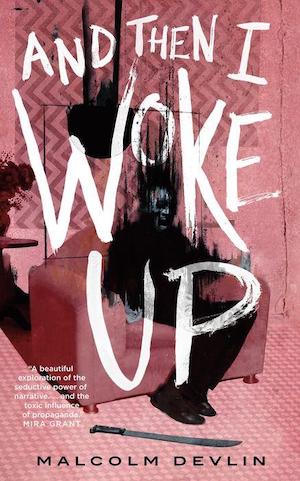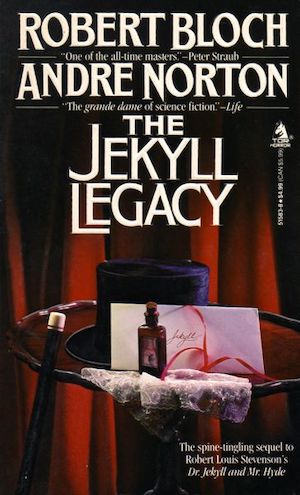I would love to know the story behind this collaboration. It’s one of very few novels Norton cowrote with a male writer, and the only one, as far as I know, with a writer of at least equal eminence. Robert Bloch was a master of the genre in his own right, and he was a prolific writer of short fiction as well as novels. His most famous work was Psycho, the novel behind the Hitchcock film. He had a long and storied career in film as well as fiction; much of his work was horror or dark fantasy.
At first I wondered if The Jekyll Legacy might have been conceived by an editor or a publisher rather than by the writers themselves: the kind of thing I’ve seen referred to as “a glitzy one-off” to capture a couple of disparate but sizable audiences. The two authors don’t seem, on the face of it, to have much in common at all. They occupy almost completely separate corners of the science fiction and fantasy genre.
And yet, whoever came up with the idea—whether Norton and Bloch together or an enterprising editor—the result is a splendid combination of their talents. It’s the kind of thing I really do love. It’s set in a vividly realized Victorian London, there’s a mystery to solve, there’s a bit more romance than Norton mostly indulged in, but still rather understated.
At heart it’s unabashed fanfic, a continuation of the classic Robert Louis Stevenson novel, Dr. Jekyll and Mr. Hyde. It picks up after the suicide of the horribly transformed doctor, and introduces his young relative and eventual heir, an orphaned Canadian expatriate who has grown up under the name of Hester Lane.
Hester has no knowledge of her heritage. She’s been raised by a reclusive, abusive father, who has died and left her destitute. She has come to London as a governess, following a very thin thread of clue, a book that points toward the mystery of her father’s origins.
When the novel begins, Hester’s employment has been terminated by her charge’s grandmother. Her funds are nearly exhausted, and she is trying to find employment as a journalist. She very much values her independence, which is a difficult thing for a woman to maintain in that place and time.
Hester fits nicely into the spectrum of Norton’s Gothic heroines. She’s an orphan as most Norton protagonists are, with a mother who is essentially a nonentity, and a father who has treated her poorly. She has to find her own way in the world, but she also has an inheritance to claim, if she can—and in this case, if she will; there’s great evil in the Jekyll legacy, as she learns once she’s forced by circumstance to claim it.
There’s a strong strain of social justice about the novel. Hester’s plight as a woman alone without resources drives her to seek employment with a ladies’ magazine that tries to educate its privileged readers about the predicament of the lower classes—but not too obviously or with too much uncomfortable accuracy. Sent to report on a meeting of the newly formed Salvation Army, Hester dives deep into the very real horrors of life among London’s poor, while also, for her own survival, accepting the inheritance to which her family connection entitles her.
Buy the Book


And Then I Woke Up
Dr. Jekyll and Mr. Hyde explores the fundamental duality of human nature, the conflict between good and evil that exists in every human heart. Hester’s legacy, wealth and property aside, is the dark secret that destroyed her relative, and that has somehow survived the death of Jekyll/Hyde. Or did Hyde really die? That’s one of the mysteries she has to solve.
It’s fascinating to see how the collaboration with Bloch deepened and expanded Norton’s ongoing theme of the battle between Light and Dark. Jekyll/Hyde is the literal manifestation of this fundamental conflict. Hester’s situation, the choices she has to make, the contrast between the poverty her father left her in and the wealth she inherits, further develops the theme. She is never tempted to go over to the dark side, but the dark side threatens her life and livelihood in multiple ways.
It’s a gripping read. Hester is a fairly standard Norton protagonist, but she holds her own in the story, and she’s rather less driven by outside forces than often happens in a Norton novel. She has a strong moral compass; she stands her ground against both the relentless police inspector—who represents Lawful Good—and the shadowy manifestations of Chaotic Evil. Though she’s deceived by a false friend, she doesn’t come across as plot-stupid. She’s an honest person who presumes honesty in others. That’s more to her credit than not, even when it nearly costs her her life.
My only regret is that there’s no other collaboration between Norton and Bloch. It really was an inspired pairing, though I’d never have thought so before I read it.
Next I’ll make one last stop in the world of the Time Traders, another collaboration with P.M. Griffin, Firehand.
Judith Tarr has written historicals and historical fantasies and epic fantasies and space operas, many of which have been published as ebooks. She has won the Crawford Award, and been a finalist for the World Fantasy Award and the Locus Award. She lives in Arizona with an assortment of cats, a blue-eyed dog, and a herd of Lipizzan horses.











If you asked me to make a list of possible Norton collaborators, Bloch would never have made that list.
@1 Honestly. And yet it worked. I wish I knew whose idea it was to do this.
This sounds fascinating; I’ve paged it from the library network and will be interested to compare it with Goss’s Athena Club trilogy, which starts with Jekyll’s daughter trying to figure out how she’s going to survive with him dead — and goes off in an entertaining but very different direction. (for your possible amusement: when I searched the local library for this, the only thing that came up was an e-copy of “An Act to enable His Majesty to allow to the residuary legatees of Sir Joseph Jekyll Knight, late master of the rolls, deceased, part of the legacy given by his will to the use of the sinking fund”, dated 1747.)
I barely got to talk to Bloch when he was GoH at my home convention, but I got the impression from people who knew him that he personally was far from the macabre persona that might have been expected from his books. He wouldn’t have read Norton while growing up (as I did) as he was 34 (per ISFDB) when she was first published, but he might have known her work (and suggested a collaboration after she started doing them), or she might have thought the frame was something he’d be good with and suggested him — although my guess is that it was someone behind the scenes who brought them together.
How did I not know that Andre Norton and Robert Bloch collaborated on a novel?! Or if I did ever know it, how did I forget?
Maybe this superficially incongruous collaboration only underscores the Jekyll and Hyde theme? (Bloch would have proudly been the Hyde of the pair.)
Norton did one, maybe two, collaborations with Robert Adams who was dying from cancer. Now that was a combination that is closer to Jekyll and Hyde. I disliked Adams’ solo books for their abuse and sexualization of women. The collaboration was so bland I doubt he had much of a part in writing them.
Actually… they did one other collaboration. A pair of Witch World short stories in the first Tales of the Witch World collection. Andre wrote about the birth of Kerovan, (the male protagonist of the Gryphon trilogy novels) from the perspective of the castle seamstress, and Robert Bloch retold the same story of Kerovan’s birth from the perspective of his mother’s wicked Wisewoman. The two linked tales are “Of the Shaping of Ulm’s Heir” (Norton) and “Heir Apparent” (Bloch).
Interesting. I never knew Bloch so much as dabbled in heroic fantasy. I seem to recall he was notorious in Weird Tales fandom for his witty dismissal of REH’s Conan.